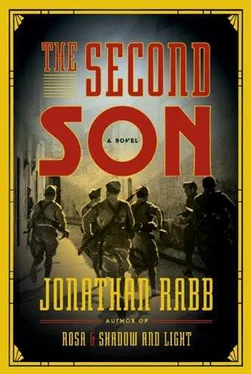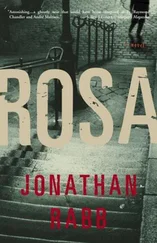Jonathan Rabb - The Second Son
Здесь есть возможность читать онлайн «Jonathan Rabb - The Second Son» весь текст электронной книги совершенно бесплатно (целиком полную версию без сокращений). В некоторых случаях можно слушать аудио, скачать через торрент в формате fb2 и присутствует краткое содержание. Жанр: Политический детектив, на английском языке. Описание произведения, (предисловие) а так же отзывы посетителей доступны на портале библиотеки ЛибКат.
- Название:The Second Son
- Автор:
- Жанр:
- Год:неизвестен
- ISBN:нет данных
- Рейтинг книги:4 / 5. Голосов: 1
-
Избранное:Добавить в избранное
- Отзывы:
-
Ваша оценка:
- 80
- 1
- 2
- 3
- 4
- 5
The Second Son: краткое содержание, описание и аннотация
Предлагаем к чтению аннотацию, описание, краткое содержание или предисловие (зависит от того, что написал сам автор книги «The Second Son»). Если вы не нашли необходимую информацию о книге — напишите в комментариях, мы постараемся отыскать её.
The Second Son — читать онлайн бесплатно полную книгу (весь текст) целиком
Ниже представлен текст книги, разбитый по страницам. Система сохранения места последней прочитанной страницы, позволяет с удобством читать онлайн бесплатно книгу «The Second Son», без необходимости каждый раз заново искать на чём Вы остановились. Поставьте закладку, и сможете в любой момент перейти на страницу, на которой закончили чтение.
Интервал:
Закладка:
“I love you,” he said again.
She waited. “I’m glad of it.”
Hoffner clasped the wheel and took the car back onto the road.
There was a village inn for the night, and they slept, and in the morning they crossed just this side of Plasencia. It was a small platoon, papers glanced through, passage permitted. One of the soldiers asked where Hoffner had gotten the car. Stolen, he said, from a peasant using it for chickens. The men laughed and watched them drive through.
In Coria, he told her it would be better if he went to the headquarters alone: no need to explain a woman or the second Safe Conduct. It would be a German looking for Germans. She agreed, but they both knew he was doing it for her. She would sit in a church and wait.
At the headquarters Hoffner met little resistance. He was shown to a sergeant, who escorted him to a lieutenant, who finally took him to see a captain. The man was on the top floor, and when he turned from the window, he struck Hoffner across the face with such force that Hoffner went careening into the arms of the waiting lieutenant.
The captain-recently arrived from Zaragoza, and with a red mark below the eye that he wore like shame-smoothed back his hair and waited for Hoffner to regain his feet. He struck him again.
“Where is the woman?” Captain Doval said.
Hoffner straightened himself up. His mouth was full with blood. He turned and spat and said, “What woman?”
Doval struck him a third time. “Not so clever now.” He turned to the lieutenant. “Get this filth out of here and start looking for the woman.”
His cell smelled of mint. It made no sense. The walls were more mildew than stone, and the bars along the window peeled up in petals of iron and rust. There was a pot in the corner for his shit, and a cot with two chains holding it to the wall. For twenty minutes a day, a strip of sunlight crept up along the iron door, settled on the bolt, and then vanished, leaving behind a mist of heat and decay. At night there were screams, muffled cries of “?Madre!” and “?Socorro!” and always the sounds of a single shot and laughter.
Save for the pain from his beatings, Hoffner felt remarkably at peace. It was time now to sit and wait and die, and while Doval might have thought this a kind of torture, Hoffner lay with his back against the wall and understood that here, at the end, there was nothing to regret. He might have come up short in finding Georg, but the boy was alive.
Doval was proof of that. Hoffner had no doubt that Doval had made the second call to Berlin. He now knew what a fool he had been. If Georg were dead, Doval would have paraded the boy out, just to see Hoffner’s face. Georg was alive. As was Mila. These were pleasures Doval would never have denied himself.
Isolation, then, and the sometime wailing of a distant voice were all the solace that Hoffner needed. He was having trouble closing his left eye, and his hands were swollen, but such was the price for a quiet mind.
To be fair, it had taken him a day or so to get to this point. The first night had been a struggle not to lose himself. They had marched him out three times to a wall, set him against the wet bricks, and placed a blindfold over his eyes. Someone had fired a shot. Standing there, Hoffner had waited for the pain. Surely there was pain, he thought, and yet, could it be this quick, this deliberate? A guard had laughed and said, “You’re not dead, not yet,” and a hand had gripped his arm and taken him back to his cell. There, two others had spent a good hour battering his face.
“Now you’re ready,” one of them had said, and out to the wall again, the blindfold but no shot. Hoffner had waited for hours, his legs buckling, his eyes wet with tears, and he had heard the guards laugh, and again the rough grip on his arm as he was pulled back to his cell so they could work on the hands.
The third time, with the sun just coming up, there had been no blindfold, no guards. They had placed him across from the entrance gate, opened it, and left him there alone, twenty meters from the outside. Staring through, Hoffner had seen two women move across the square, a cart rolled into place. A man had filled a bucket with water. And Hoffner had looked up to see the figure of Doval in a window, staring down. Hoffner had kept himself perfectly still. When his legs finally gave out, the guards returned and dragged him back to his cell.
It was only on the third or fourth day that Hoffner realized they never asked any questions. The beatings were silent but no less vicious for it. There was nothing they hoped to learn from him, save perhaps for the time it took a man to sit and wait to be cracked across the face before begging to be killed. Hoffner decided to leave that choice in their hands. He respected the silence, everything beyond his own groans and the sound of his vomiting.
He thought of Mila-of course-and Georg, and little Mendy with his picture of the badge and the scrawl. These were obvious thoughts. Hoffner expected others to follow, the ones where a man sets his life in order before he knows he will die, but such things never came. Instead, it was brief images of Martha and Sascha, the water of Wannsee in the late summer, and the bludgeoned face of a man he had caught in the act of raping a woman nearly thirty years ago. There was nothing to them, no coherence. Hoffner wondered if perhaps this was the way a life settles itself, not with meaning or purpose but with memories recalled despite themselves. A beckoning to God might have brought some sense to it, but Hoffner knew there was nothing for him there.
Instead, he kept his mind on Mila. She had come at the end. She had been better than anything he had ever known. There had to be something in that. He pictured her back in Barcelona, and it was enough.
The bolt to his cell released, and the hinges creaked as the door opened. Hoffner sat patiently waiting for the order to stand. He had gotten up on his own two days ago and had received a fist to the groin. Better to wait.
The man barked, and Hoffner stood. Hoffner then stepped out into the hall and fell in behind the second guard.
Hoffner was now familiar with the curve of the wall, the number of paces between each cell, and the sounds of weeping and prayers behind each door. He thought, Shouldn’t the praying make it all right, not for the soul but for the soldiers passing by: the echo of a prayer, confirmation of a good Catholic waiting inside? Wasn’t that enough for a fascist to set a man free?
They came to the steps that led down to the large courtyard, where the wall awaited him. A light shone from a wire high above, and another was fixed to the wall. Hoffner placed it at somewhere between three and four in the morning. There had been rain and no moon, and the lights spread out in two wide ovals across the mud and tufts of wild grass. The air still smelled of rain and brought a welcome moistness to his lips.
The guards placed him by the wall and stepped to their positions across from him, rifles held at their chests. They waited. Minutes passed before a door in the distance opened and a man emerged. It was difficult to see him through the glare, but Hoffner knew it was Doval.
Doval stepped across to the main gate, opened it, and began to make his way back. He was in full uniform, his boots high to the knee. Hoffner hadn’t seen him this close since that first afternoon. Doval moved past the soldiers and up to Hoffner. He had been drinking.
“You’re dismissed,” Doval said to the two soldiers, as he stared at Hoffner.
The men turned at once and headed for the door. Doval waited for the sound of the latch before stepping closer.
“No one to stop you from going,” Doval said, his words loose. “Look around. No one.”
Читать дальшеИнтервал:
Закладка:
Похожие книги на «The Second Son»
Представляем Вашему вниманию похожие книги на «The Second Son» списком для выбора. Мы отобрали схожую по названию и смыслу литературу в надежде предоставить читателям больше вариантов отыскать новые, интересные, ещё непрочитанные произведения.
Обсуждение, отзывы о книге «The Second Son» и просто собственные мнения читателей. Оставьте ваши комментарии, напишите, что Вы думаете о произведении, его смысле или главных героях. Укажите что конкретно понравилось, а что нет, и почему Вы так считаете.












